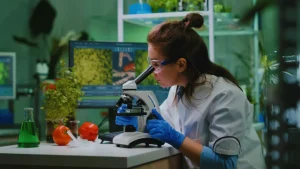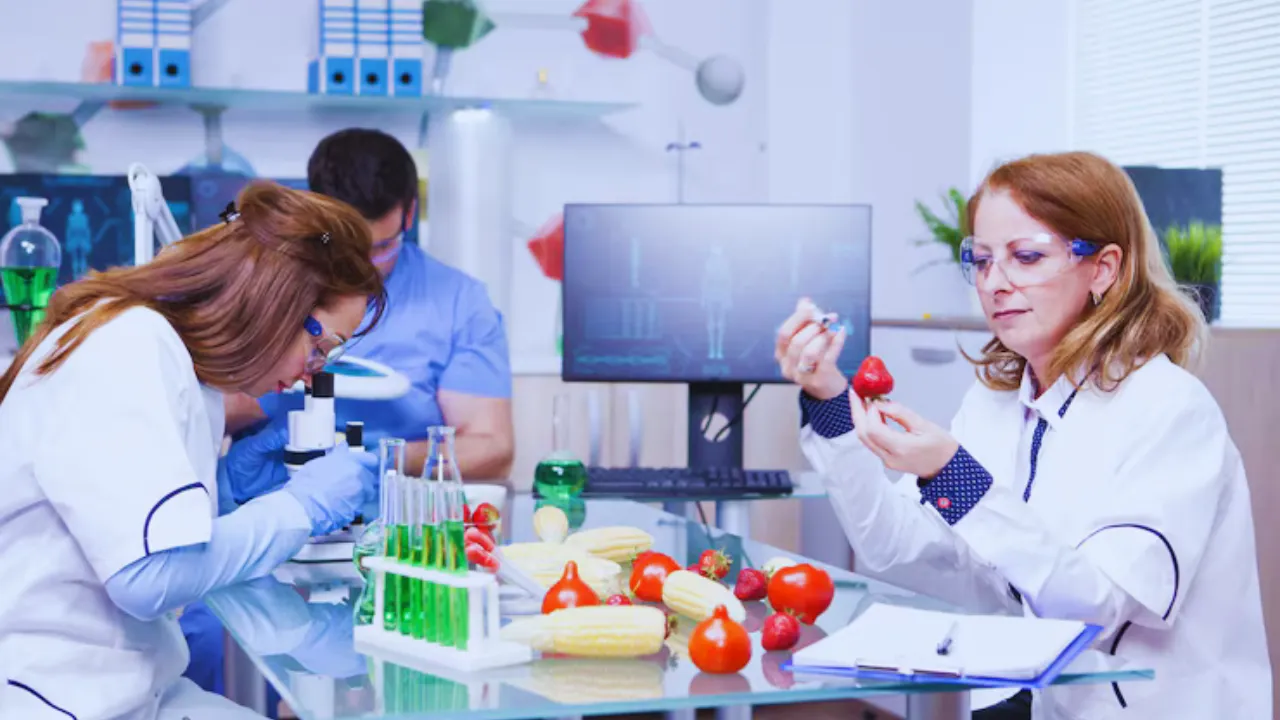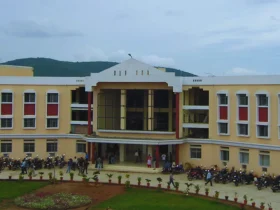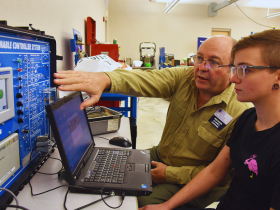The field of food science and technology is expanding rapidly, thanks to the global demand for safe, nutritious, and innovative food products. In 2025, pursuing an MSc Food Science and Technology Course offers promising academic and career opportunities. It not only nurtures scientific skills but also equips students with advanced skills to innovate and lead in the food industry. Modern advancements in biotechnology, processing techniques, and nutritional sciences have further enhanced the scope of this dynamic course. Students not only study the composition and properties of food but also research ways to improve quality, safety, shelf life, and taste.
With growing health consciousness among consumers and strict regulatory standards globally, food science professionals are becoming crucial assets. Institutes are now offering specialized modules to prepare students for international standards. From research laboratories to food manufacturing units, career doors are wide open. Industry collaborations, internships, and real-world projects during the MSc program are helping students gain a competitive edge. In a world driven by technological innovation and sustainability, MSc Food Science and Technology remains a future-proof choice.
Why Choose an MSc Food Science and Technology in 2025?

In 2025, food technology is recognized as one of the most vital and rapidly evolving industries worldwide. Pursuing an MSc Food Science and Technology ensures a perfect blend of scientific research, technological advancements, and food safety expertise. Students study a wide range of subjects, including food chemistry, food microbiology, processing technologies, and nutrition science. This course prepares graduates to innovate, solve industry challenges, and meet global food demands.
With rising concerns about food safety and sustainable production, trained professionals are highly sought after. Institutions now integrate advanced laboratory training and industry collaborations into their curriculum. MSc Food Science and Technology offers career flexibility across multiple sectors like healthcare, hospitality, and manufacturing. Choosing this course in 2025 ensures entry into a dynamic, future-proof industry.
MSc Food Science and Technology Course
The MSc Food Science and Technology course in 2025 focuses on advanced food chemistry, microbiology, processing, and safety management. It is designed to blend theoretical concepts with hands-on laboratory training and industry-oriented projects. The program structure ensures students gain the scientific and technological expertise needed for diverse food sector careers.
| Particulars | Description |
| Course Name | MSc Food Science and Technology |
| Course Duration | 2 Years |
| Eligibility | BSc in Food Science, Biotechnology, Microbiology, Agriculture, or related fields |
| Top Subjects | Food Microbiology, Food Processing, Quality Control, Food Safety Management |
| Average Fees | INR 50,000 – INR 2,50,000 per year |
| Top Recruiters | Nestlé, Amul, ITC, Britannia, PepsiCo, Mondelez |
Qualifications for the 2025 MSc in Food Science and Technology
Admission into this prestigious course requires candidates to meet specific eligibility conditions set by the university. Applicants must hold a Bachelor’s degree in Food Technology, Biotechnology, Agricultural Sciences, or related disciplines. In undergraduate courses, a minimum cumulative score of approximately 55% is generally expected. Reserved category students may receive relaxation as per government norms.
Some institutes conduct entrance examinations such as ICAR AIEEA-PG or CUET-PG for selection. A few top universities may also include personal interviews during the final admission process. Candidates are advised to check the specific eligibility guidelines of each institute. Meeting these academic and entrance criteria ensures successful enrollment into the MSc Food Science and Technology program.
Admission Process for MSc Food Science and Technology 2025
Admission into the MSc Food Science and Technology programs typically involves entrance exams or merit-based selection. Students must submit online applications and appear for exams like ICAR AIEEA-PG, CUET-PG, or university-specific tests. Some institutes also conduct personal interviews during the final selection. Document verification and payment of fees complete the admission process.
MSc Food Science and Technology Courses and Curriculum
The syllabus includes core areas such as Food Microbiology, Food Chemistry, and Food Processing Technology. Students also study Food Safety, Nutrition, Packaging Technology, and Research Methodology. Practical laboratory sessions and project work form an important part of the curriculum. The course structure ensures both theoretical knowledge and hands-on industry exposure.
Top Colleges for MSc Food Science and Technology in 2025
Students aiming for the best education in food science should target reputed and industry-focused colleges. Leading institutes offer strong academic training, research opportunities, and global exposure to students. Here’s a table summarizing some of the most popular choices for 2025 admissions.
| College Name | Location | Special Features |
| Entrepreneurship and Management in Food Technology, National Institute (NIFTEM) | Haryana | Advanced labs, Global internships |
| Central Food Technological Research Institute (CFTRI) | Mysuru | Research-driven curriculum |
| Amity University | Noida | Global collaborations |
| IIT Kharagpur | Kharagpur | Food Process Engineering specialization |
| University of Delhi | Delhi | Affordable education, top faculty |
Career Opportunities after MSc Food Science and Technology
Graduates of MSc Food Science and Technology have a broad spectrum of career opportunities across industries. Popular roles include Food Technologist, Quality Control Analyst, Food Safety Officer, and Product Development Specialist. Research Scientist positions are available in private laboratories and government agencies. The hospitality industry, retail chains, and pharmaceutical companies also hire food science experts.
Specialized roles in regulatory affairs and packaging technology are emerging rapidly. Opportunities in food export, inspection services, and consultancy firms are growing worldwide. Entrepreneurship in functional foods, organic products, and health supplements offers another rewarding career path.
Emerging Fields in Food Science in 2025
Emerging fields in 2025 include plant-based food innovations, personalized nutrition, and sustainable packaging technologies. Artificial intelligence and automation are also being integrated into food production systems. Globally, research on nutraceuticals and functional foods is accelerating. These new areas create exciting opportunities for MSc Food Science and Technology graduates.
Expected Salary Range After MSc Food Science and Technology
The expected salary range for MSc Food Science and Technology graduates in 2025 is highly attractive. Freshers can earn between INR 3 to 6 LPA, depending on the job role and organization. With experience, salaries can rise to INR 10–20 LPA, especially in research or international companies. Specialized skills and certifications boost earnings even further.
Skills Required for Success in Food Science and Technology
Success in food science and technology demands a strong foundation in scientific concepts like microbiology, chemistry, and processing techniques. Analytical thinking is critical for quality assessment and problem-solving in product development. Practical laboratory skills and technological adaptability help students manage evolving food processing systems. Communication and teamwork skills are when working with cross-functional industry teams.
Attention to detail ensures compliance with strict food safety and regulatory standards. Research skills, data interpretation, and technical report writing are equally important. Project management abilities enhance efficiency in handling real-world assignments and meeting industry deadlines. A passion for innovation and continuous learning drives long-term career growth in this dynamic field.
Future Scope of MSc Food Science and Technology
The future for MSc Food Science and Technology graduates looks highly promising in 2025 and beyond. Innovations in sustainable foods, functional foods, and biotechnology are driving new career paths. Demand for skilled professionals in food safety, product development, and regulatory affairs is rising globally. International opportunities are also expanding across research and corporate sectors.
Challenges Faced in the Food Industry
Despite the growth, the food industry faces significant challenges in 2025. Rapid changes in food safety regulations demand continuous adaptation and learning. Managing sustainable practices while ensuring profitability remains a concern for companies. Additionally, keeping up with evolving consumer preferences and technological advances requires constant innovation and flexibility from food professionals.
Top Recruiters for MSc Food Science and Technology Graduates
Top recruiters actively seeking MSc Food Science and Technology graduates in 2025 include Nestlé, PepsiCo, ITC Limited, Britannia, and Hindustan Unilever. These companies hire for roles in product development, quality assurance, food safety, and research. Mondelez International, Marico, Dabur, Mother Dairy, and Amul are also major employers offering attractive packages.
In addition to private businesses, public sector organizations like as ICAR and FSSAI need skilled food science specialists. Many multinational corporations now offer global placements for graduates with specialized certifications. Startups in the sustainable food and health nutrition sectors are also creating fresh career avenues. The diversity of recruiters ensures that graduates can find rewarding opportunities across manufacturing, research, regulatory, and innovation domains.
Internship and Training Opportunities
For MSc Food Science and Technology students who want to develop their practical abilities, internships are essential. Many food companies offer summer internships, leading to potential PPOs (Pre-Placement Offers). Top institutions like CFTRI and NIFTEM arrange research internships funded by government bodies. Internships allow students to gain industry exposure and real-world research experience.
Government Jobs after MSc Food Science and Technology
Graduates can pursue a range of government jobs after completing their MSc Food Science and Technology. Roles like Food Safety Officer, Food Inspector, and Quality Analyst in the public sector are popular options. Competitive exams are usually conducted for these positions by FSSAI, ICAR, and state food departments. Getting a government job guarantees stability and other benefits.
Research and Higher Education Prospects
For academically inclined students, pursuing higher studies after Man Sc opens exceptional pathways. A Ph.D. in Food Science, Food Technology, or Nutrition can lead to careers in teaching, specialized research, and global collaborations. Funding options like CSIR-NET, UGC scholarships, and institutional fellowships are available. These advanced studies also strengthen academic and industry credentials.
Wrapping Up
Choosing to pursue an MSc Food Science and Technology Course in 2025 can be a game-changing decision for students passionate about scientific research and food innovation. As industries focus more on nutrition, food safety, and sustainability, the demand for skilled professionals is reaching new heights. Whether one aims for roles in quality assurance, food product development, research, or regulatory affairs, the opportunities are diverse and rewarding. Advanced training modules, hands-on laboratory experience, and industry internships are now standard parts of the program to prepare students for global roles.
Graduates can seamlessly transition into multinational companies, research institutions, or entrepreneurial ventures. With evolving consumer trends and technological breakthroughs, food science is no longer limited to laboratories but is actively shaping global health trends. For ambitious students ready to impact the food sector, this course offers the perfect foundation. A bright and fulfilling career path awaits those who step forward with curiosity, discipline, and innovation. The future of the food and health sectors is genuinely defined by an MSc in Food Science and Technology.
FAQs
How long will the MSc Food Science and Technology program last in 2025, and how will it be structured?
Usually lasting two years, the MSc Food Science and Technology program is broken up into four semesters. Each semester blends core theory with advanced laboratory practices to build a strong foundation. Students also engage in research projects, industrial internships, and dissertation work. The curriculum ensures a holistic combination of academic and practical expertise for career readiness.
Is pursuing an MSc Food Science and Technology a good career choice in 2025?
Yes, it is an excellent career choice with rising global importance. The increasing focus on food safety, nutrition, sustainable production, and health-conscious products boosts career prospects. Opportunities for graduates can be found in research, food manufacturing, regulatory bodies, and global corporations. With emerging fields like functional foods and AI in food processing, the future is even brighter.
What types of job roles are available after completing an MSc Food Science and Technology’s?
Graduates can enter diverse roles such as Food Technologist, Quality Control Analyst, Food Safety Officer, Regulatory Affairs Specialist, and Research Scientist. Opportunities exist in industries like dairy, beverages, packaged foods, pharmaceuticals, and biotech firms. Some professionals also move into consulting, export quality inspection, and entrepreneurship in niche food markets.
Which entrance exams are commonly required for admission into MSc Food Science and Technology’s programs?
Admissions are mainly based on entrance exams like ICAR AIEEA-PG, CUET-PG, and specific tests conducted by top institutions such as NIFTEM and CFTRI. Direct merit-based admissions based on undergraduate performance are available at certain universities. It is crucial to check each university’s specific requirements to prepare and apply accordingly for the 2025 intakes.
Can I pursue a Ph.D. after completing MSc Food Science and Technology’s?
A Ph.D. is a logical step for pupils who are driven by academics. Areas like Food Microbiology, Sustainable Processing, Functional Foods, and Biotechnology offer exciting research prospects. Scholarships from CSIR, UGC, ICAR, and international funding agencies support research scholars. A Ph.D. opens doors to academic, industrial R&D, and high-level consultancy careers globally.
What is the expected salary range after completing the MSc Food Science and Technology’s in 2025?
Freshers can expect a starting salary between INR 3 to 6 LPA in India, depending on their specialization, skills, and employer. With three to five years of experience, pay can increase to INR 8 to 15 LPA. Professionals working in international food companies, regulatory bodies, or as research scientists can achieve even higher salary packages.
What are some emerging fields for MSc Food Science and Technology’s graduates in 2025?
Emerging fields include plant-based food research, sustainable packaging innovation, personalized nutrition products, AI-driven food processing, and functional foods development. These sectors are growing rapidly as consumers seek healthier, sustainable, and innovative options. Graduates with specialized skills in these areas will find new-age roles in both startups and global corporations.




